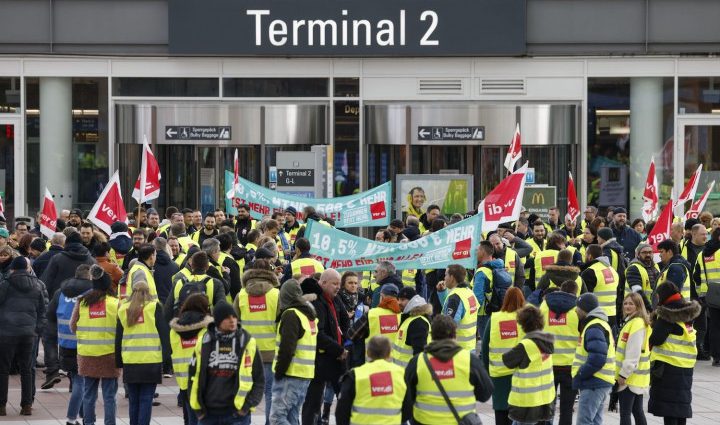Services to and from Frankfurt and Munich affected on Sunday and Monday by German labour disputes

Thai Airways International has announced the cancellation of round-trip flights on its Bangkok-Frankfurt and Bangkok-Munich routes on Sunday and Monday because of transport workers’ strikes in Germany.
Frankfurt Airport has said it will not be able to provide regular services on Monday as workers stage a one-day strike at Germany’s biggest aviation hub, adding to disruptions that have hobbled the European travel market for months amid persistent pay disputes.
The airport warned of “massive disruption” of air traffic, saying that “all tasks that enable full flight operations are suspended due to the strike” on the day, according to a statement.
Passengers, including those changing at Frankfurt airport, should avoid travel to the hub on the day, the airport operator Fraport said.
THAI said on Saturday evening that it had cancelled Flight TG920 Bangkok-Frankfurt on Sunday, TG921 Frankfurt-Bangkok on Monday, TG922 Bangkok-Frankfurt and TG923 Frankfurt-Bangkok on Monday. Also cancelled were TG924 Bangkok-Munich on Sunday and Monday, and TG925 Munich-Bangkok on the same two days.
Passengers scheduled to travel on the affected flights are advised to visit Thaiairways.com for updates or call the THAI Contact Center (24 hours) at 02-356-1111.
Strikes have rippled through the aviation industry for months as workers in areas like baggage handling and security services seek higher wages amid a cost-of-living squeeze. The dispute hits the industry ahead of the peak travel period, with Easter approaching and travellers returning in droves after years of Covid restrictions.
Transport across much of Germany is expected to be paralysed Monday as workers strike demanding higher wages to cope with surging inflation, the latest industrial action in Europe’s top economy.
Staff at airports, ports, railways, buses and subways will walk out across large parts of the country, the Verdi and EVG unions announced on Thursday.
“We think there will be extensive participation in the strike,” Verdi chief Frank Werneke said.
EVG chief Martin Burkert accused employers — who have mostly refused hefty pay demands — of “turning a blind eye to the economic hardship of the workers that we represent”.
Like their peers in many other countries, Germans are struggling with high inflation — it hit 8.7% in February — after Russia’s invasion of Ukraine sent food and energy costs soaring.
Verdi represents 2.5 million public sector employees, while EVG represents workers on the railways and at bus companies.
It is rare for unions to join forces to call a strike in Germany, and it follows a series of failed talks with employers.
Verdi is demanding a rise of 10.5% in monthly salaries, while EVG is demanding a 12% rise for those it represents.
Employers, mostly the state and public sector companies, have so far refused the demands, instead offering a rise of 5% with two one-off payments of 1,000 and 1,500 euros, this year and next.
Employers’ representatives are warning that unions are making unreasonable demands and risk alienating the public with the growing wave of strike action.
“What impression is created of the public service, especially at a time when we are talking about a disproportionate shortage of skilled workers?” said Karin Welge, from the Confederation of Municipal Employers’ Associations.
“We have a common duty to strengthen the public service.”

